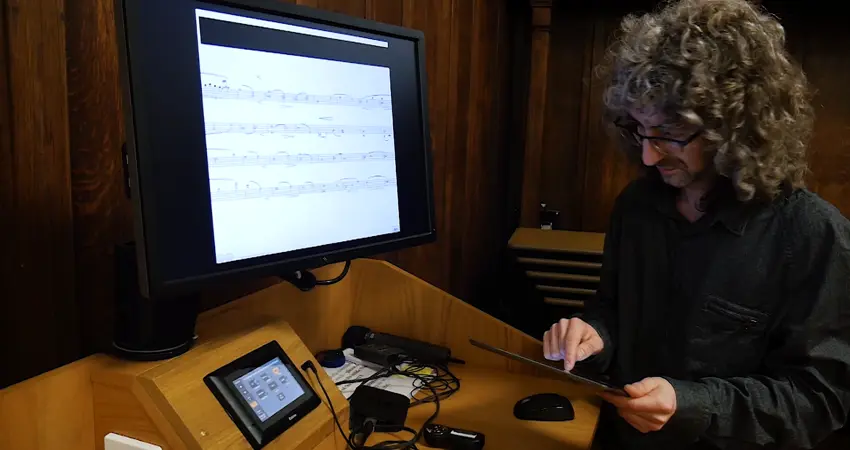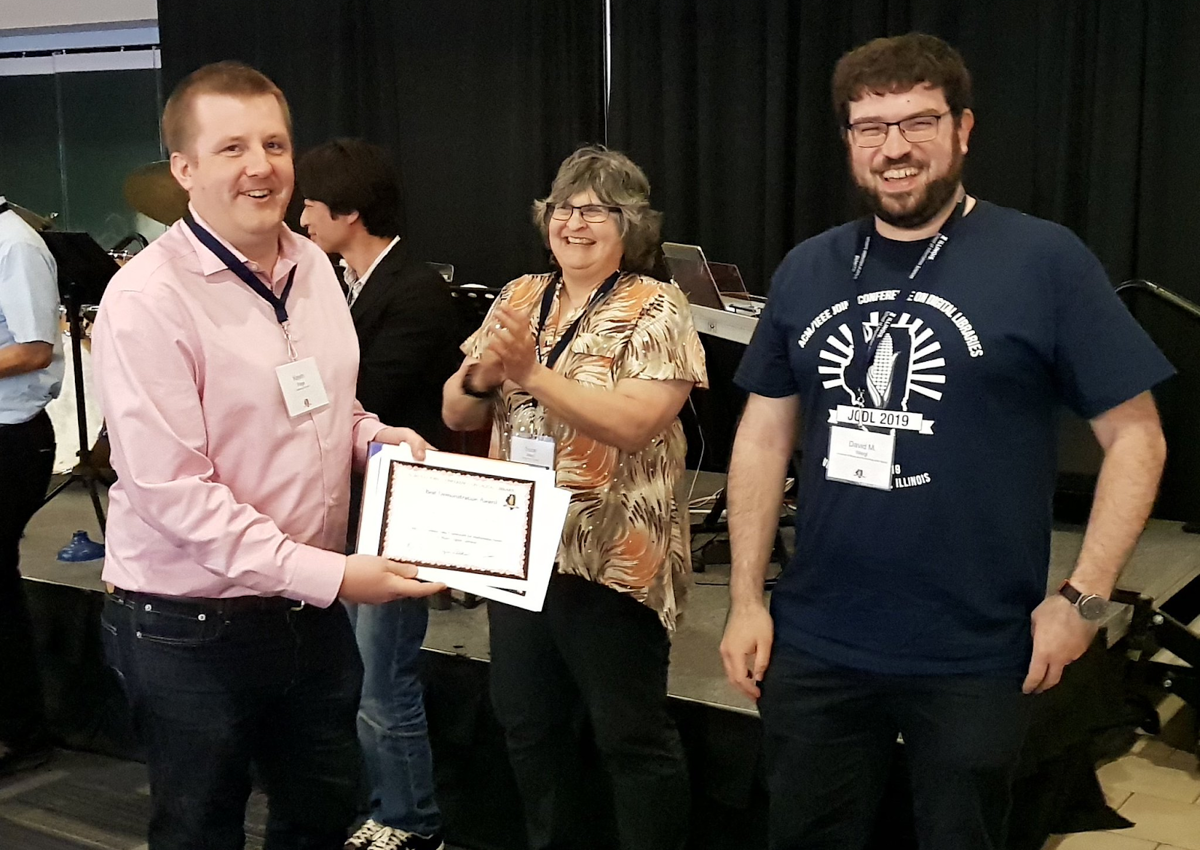11 Jul 2019
'Digital Delius' project wins Vice-Chancellor's Public Engagement and JCDL Awards
Collaboration between the Faculty of Music and Engineering Science's Oxford e-Research Centre

David Lewis setting up the string quartet live rehearsal annotation app for Digital Delius
The 'Digital Delius: Interpretation, Performance, and Analysis' project has won a Project Award in this year’s Vice-Chancellor’s Public Engagement with Research Awards. The announcement was made at an awards ceremony at Keble College, Oxford, on 10 July 2019, hosted by Vice-Chancellor Professor Louise Richardson.
The project explored the cosmopolitan connections of the composer Delius and his creative affinity with the landscapes and cultures of other countries. The team created a catalogue of his works which demonstrated his painstaking compositional process and the multiple versions his pieces went through as he refined them.
“We worked with the British Library, the Delius Trust and the Villiers Quartet to create a permanent digital exhibition of Delius’s manuscripts supported by a range of outreach activities”
Professor Daniel Grimley, Faculty of Music, who led the project
“This was fundamentally a team effort, bringing together musicologists, computer scientists, performers and heritage experts, leading to a number of collaborative projects and papers. This research also lays the foundation for future researchers in heritage and digital musicology,” adds Professor Grimley.
The Oxford e-Research Centre's work on the project was led by co-investigator Dr Kevin Page, a Senior Researcher and Associate Member of Faculty within the Department of Engineering Science. As Dr Page highlights, "Digital Delius demonstrates how technologies developed by the team, including our MELD framework, can be used not only to support digital musicology, but also to present this scholarship to new audiences in approachable and exciting ways, increasing public access and understanding." MELD is a flexible software platform for research which combines digital representations of music - such as audio and notation - with contextual and interpretive knowledge in the Semantic Web.
The objectives of the Digital Delius project were to enable wider understanding and appreciation of musical sources, using Delius as a rich case study through access to the manuscripts, to show what they mean and to provide a holistic view of the whole life-cycle of a musical work.
Engagement activities included: a commercially-released recording; a schools workshop with the Oxfordshire County Youth Orchestra, a performance by the orchestra for primary age children; a workshop with the Villiers String Quartet and Oxford students using digital technology; and a seminar for GSCE and A-level students on composer manuscripts.
“It was very interesting to see how composers wrote their music and how they didn’t write it from start to finish but a little bit at a time,” commented a participating school student.
Particular recognition is due to the wider project team, including Dr Joanna Bullivant, Faculty of Music; David Lewis, Engineering Science; Helen Faulkner, The Delius Trust; and Dr Amelie Roper, British Library and James Dickenson, Villiers Quartet.
"These awards highlight the many ways that Oxford’s researchers engage with the public"
Professor Alison Woollard, Academic Champion for Public Engagement with Research, University of Oxford says: “These awards highlight the many ways that Oxford’s researchers engage with the public. This includes informing and empowering people by sharing research findings; working in partnership with communities to shape research and enabling citizens to take part in the research by collecting and analysing data through Citizen Science. These winning projects also demonstrate that excellence in engagement results in a ‘win-win’ for both researchers and publics alike.”
MELD framework awarded Best Demonstration award at JCDL 2019
Dr Page also presented the Centre’s MELD - Music Encoding and Linked Data - framework at the ACM/IEEE Joint Conference on Digital Libraries (JCDL), where it was awarded the Best Demonstration award following a vote by conference attendees.
‘MELD: a Linked Data Framework for Multimedia Access to Music Digital Libraries’ was presented at the JCDL 2019 conference held in June at the University of Illinois Urbana-Champaign, USA. The framework was originally developed during the EPSRC funded FAST project, and has since been used in a variety of industrial, creative arts, and digital musicology scenarios. The award-winning JCDL demonstration included two applications of MELD developed during the Digital Delius project: a tablet app for live annotation of string quartet rehearsals; and an enhanced multimedia version of an article for the British Library’s Discovering Music series.
Dr Page says, “through MELD we’ve developed powerful new approaches for combining the many different forms of digital music material, building on a combination of Linked Data and the Music Encoding Initiative (MEI). This opens up many new possibilities for access and scholarship for Music Digital Libraries, which I’m delighted has been recognised by the JCDL community.”
These honours follow the award of a British Library Labs research prize to Digital Delius in 2018.

Kevin Page and David Weigl receiving the JCDL Best Demonstration award
Further information about the Digital Delius project
The exhibition was created simultaneously with the British Library’s new web resource, Discovering Music, launched in 2018. In addition to an online exhibition, the project has raised the profile of Delius and his music, with the Villiers Quartet recording achieving 247,000 listens on Spotify and being featured multiple times on BBC Radio 3.
Related paper:
Publishing musicology using multimedia digital libraries: creating interactive articles through a framework for linked data and MEI David Lewis, David Weigl, Joanna Bullivant, Kevin Page, Proceedings of the 5th International Conference on Digital Libraries for Musicology 2018
About the Public Engagement with Research Awards
The Vice-Chancellor's Public Engagement with Research Awards recognise and reward those at the University who undertake high-quality engagement activities and have contributed to building capacity in this area. The awards are in three categories – Early Career Researcher, Building Capacity and Projects. Entrants can be at any level in their career and activities of any scale are welcome.
Winning entries receive recognition for their achievements at the Vice-Chancellor's Public Engagement with Research Awards Ceremony that took place on 10 July 2019. The Vice-Chancellor’s prize was also announced at the ceremony, with the winner to receive a cash prize of £1,500.




